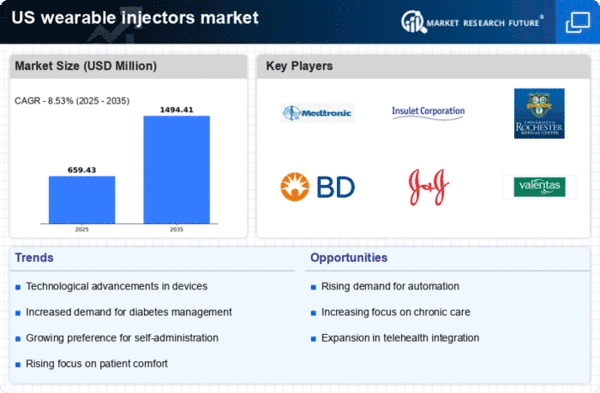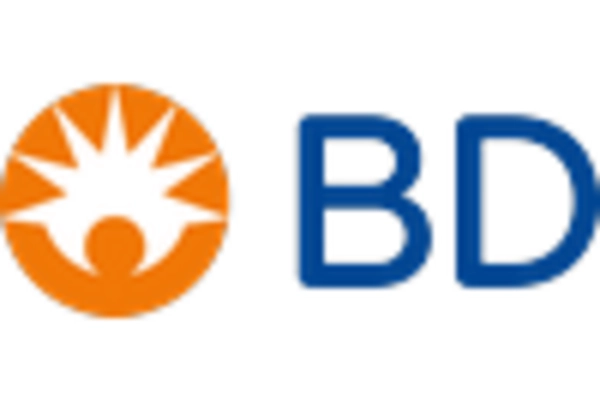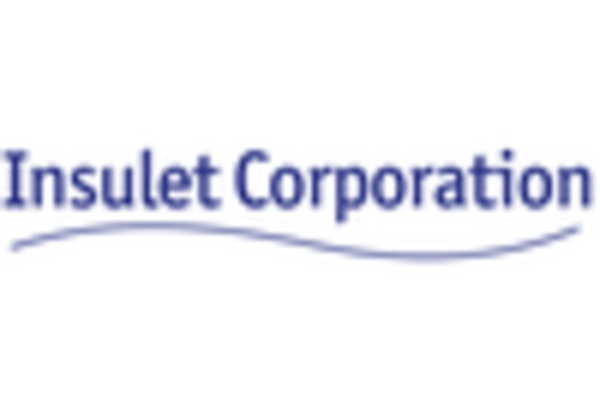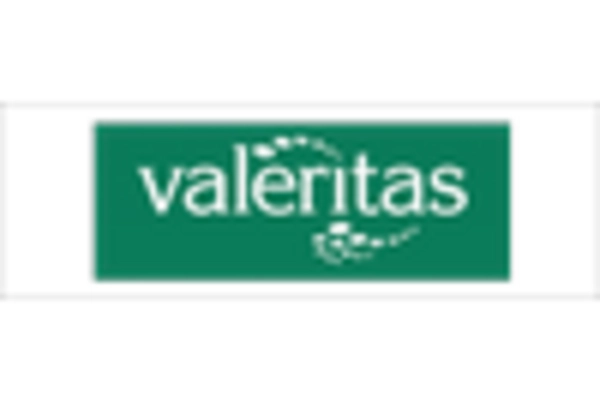Rising Prevalence of Chronic Diseases
The increasing incidence of chronic diseases such as diabetes and cardiovascular conditions is a primary driver for the wearable injectors market. As of 2025, approximately 34.2 million Americans are diagnosed with diabetes, necessitating regular insulin administration. This trend indicates a growing demand for innovative drug delivery systems that enhance patient compliance and convenience. Wearable injectors offer a user-friendly solution, allowing patients to manage their conditions more effectively. The market is projected to grow at a CAGR of around 15% from 2025 to 2030, reflecting the urgent need for advanced medical devices in chronic disease management. Consequently, the rising prevalence of chronic diseases is likely to propel the wearable injectors market forward, as healthcare providers seek efficient solutions to improve patient outcomes.
Regulatory Support for Innovative Devices
Regulatory support for innovative medical devices is a significant driver for the wearable injectors market. The US Food and Drug Administration (FDA) has streamlined the approval process for novel drug delivery systems, encouraging manufacturers to bring new products to market. This regulatory environment fosters innovation and enhances competition within the industry. As of 2025, the FDA has approved several wearable injectors, paving the way for broader adoption among healthcare providers and patients. The supportive regulatory framework is expected to facilitate market growth, as companies are more likely to invest in the development of advanced wearable injectors. Consequently, the regulatory landscape plays a pivotal role in shaping the future of the wearable injectors market.
Technological Innovations in Drug Delivery
Technological advancements in drug delivery systems are significantly influencing the wearable injectors market. Innovations such as miniaturization, smart sensors, and connectivity features are enhancing the functionality of these devices. For instance, the integration of Bluetooth technology allows for real-time monitoring and data sharing with healthcare providers, improving treatment adherence. The market is expected to reach a valuation of $5 billion by 2030, driven by these technological innovations. Furthermore, the development of biocompatible materials is enabling the creation of more comfortable and effective wearable injectors. As technology continues to evolve, it is anticipated that the wearable injectors market will expand, offering patients more efficient and personalized treatment options.
Growing Demand for Patient-Centric Solutions
The shift towards patient-centric healthcare is a notable driver for the wearable injectors market. Patients increasingly prefer solutions that offer convenience, comfort, and autonomy in managing their health. Wearable injectors align with this trend by providing a discreet and user-friendly method for drug administration. As healthcare systems in the US emphasize personalized medicine, the demand for devices that cater to individual patient needs is likely to rise. This market segment is projected to grow by approximately 20% over the next five years, reflecting the increasing focus on patient empowerment. Consequently, the wearable injectors market is expected to benefit from this paradigm shift, as more patients seek innovative solutions that enhance their quality of life.
Increased Investment in Healthcare Technology
Investment in healthcare technology is a crucial driver for the wearable injectors market. With the US government and private sector allocating substantial funds towards healthcare innovation, the development of advanced medical devices is accelerating. In 2025, healthcare technology investments are estimated to exceed $200 billion, fostering an environment conducive to the growth of the wearable injectors market. This influx of capital supports research and development initiatives, leading to the introduction of cutting-edge products that meet evolving patient needs. As a result, the wearable injectors market is likely to experience robust growth, driven by the continuous influx of investment aimed at enhancing healthcare delivery and patient outcomes.
















